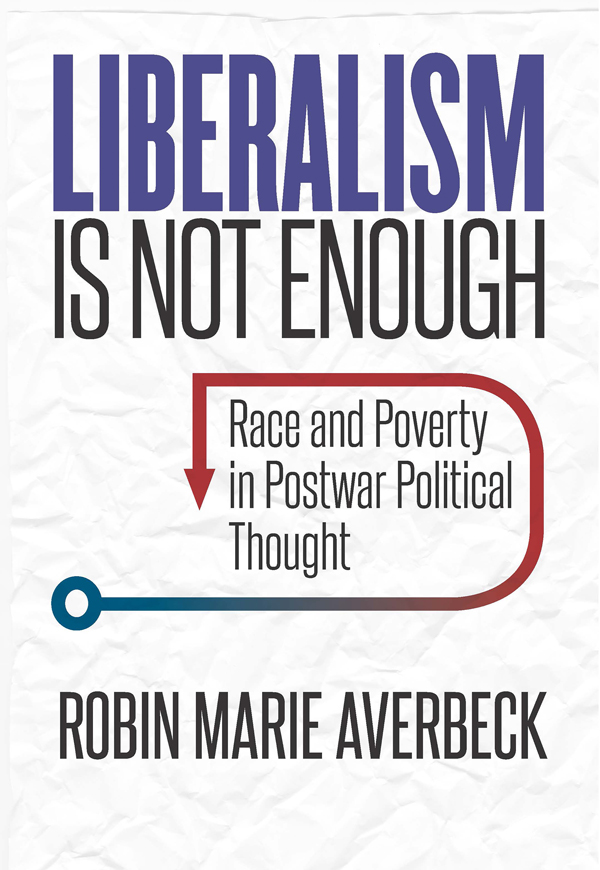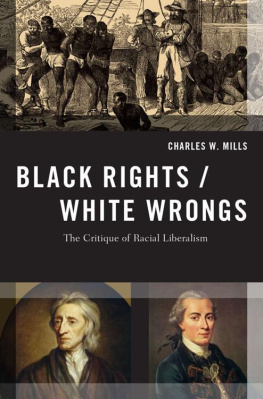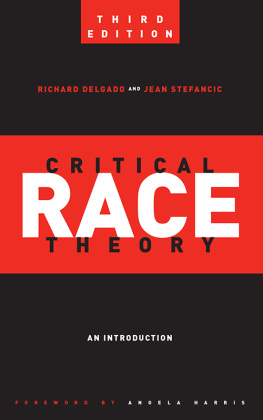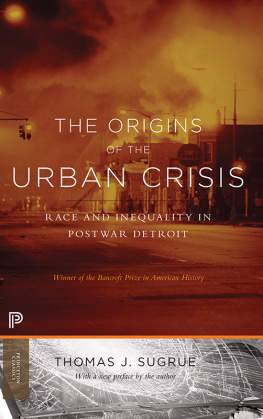Contents
Guide
Pagebreaks of the print version

Liberalism Is Not Enough
Liberalism Is Not Enough
Race and Poverty in Postwar Political Thought
Robin Marie Averbeck
The University of North Carolina Press CHAPEL HILL
2018 The University of North Carolina Press
All rights reserved
Set in Merope Basic by Westchester Publishing Services
Manufactured in the United States of America
The University of North Carolina Press has been a member of the Green Press Initiative since 2003.
Library of Congress Cataloging-in-Publication Data
Names: Averbeck, Robin Marie, author.
Title: Liberalism is not enough : race and poverty in postwar political thought / Robin Marie Averbeck.
Description: Chapel Hill : University of North Carolina Press, [2018] | Includes bibliographical references and index.
Identifiers: LCCN 2018011166| ISBN 9781469646633 (cloth : alk. paper) | ISBN 9781469646640 (pbk : alk. paper) | ISBN 9781469646657 (ebook)
Subjects: LCSH : LiberalismUnited StatesHistory20th century. | EqualityUnited StatesHistory20th century. | PoorUnited StatesSocial conditions20th century. | PovertyUnited StatesHistory20th century. | African AmericansUnited StatesSocial conditions20th century.
Classification: LCC JC 574.2. U 6 . A 79 2018 | DDC 320.51/3097309046dc23 LC record available at https://lccn.loc.gov/2018011166
For Beazie
Contents
Liberalism Is Not Enough
Introduction
The past is never dead. Its not even past.
WILLIAM FAULKNER
On June 4, 1965, President Lyndon Baines Johnson delivered the commencement address at Washington, D.C.s Howard University, a historically black university named after the first director of the Freedmens Bureau. Johnson told his audience that they represented the hopeful future of African Americanseducated and middle class. Yet, their story was not the norm. Even though the Civil Rights Act of 1964 was working to secure African Americans hard-won freedoms, and passage of the Voting Rights Act of 1965 was imminent, for the great majority of Negro Americansthe poor, the unemployed, the uprooted, and the dispossessed, Johnson said, there is a much grimmer story. African American young men were more likely to be out of work; African American babies were more likely to die from infant mortality. Poverty itself, Johnson argued, accounted at least in part for these conditionsfor African Americans, like other poor Americans, remained trapped in inherited, gateless poverty. Yet there was something else going on as well, something more subtle and difficult to trace. For Negro poverty is not white poverty, Johnson admitted. African Americans endured a poverty shaped by hundreds of years of racial oppressionoppression that had taken its toll by closing doors and scarring souls.
In order to truly address such oppression, Johnson argued, mere equality of opportunity would not suffice. Hindered by the legacy of racism, African Americans needed additional assistance in their struggle to climb the ladder of social mobility. You do not take a person who, for years, has been hobbled by chains, Johnson declared, and liberate him, bring him up to the starting line of a race and then say, you are free to compete with all the others, and still justly believe that you have been completely fair. Therefore, the goal Americans needed to set for themselves now was not just equality as a right and a theory but equality as a fact and equality as a result. Thus Johnson laid the foundations for the liberal justification of affirmative action and other federal policies that aimed at equalizing the competitive race for African Americans.
Johnsons speech at Howard University is often cited nostalgically. Those were the days, it is lamented, when liberals stood bravely for ensuring that the American dream of social mobility extended to all Americans. Can you imagine President Obama referring to 200 years of slavery? asked Bernard Anderson, an economist who attended Johnsons speech at Howard University, from the vantage point of 2013. I cannot imagine him saying anything like that.
This nostalgia rests on little evidence. At the height of its powers and popularity, Great Society liberalism never attempted a sustained, serious attack on the sources of racial inequality and injustice. Its most notable achievementsthe Civil Rights Act and the Voting Rights Actcame only after the unrelenting and unprecedented resistance strategies of black Americans made continuing the status quo politically undesirable for the Democratic Party and other elites. But the logic that compelled liberals to commit themselves to the political and legal equality of black people could not compel them to also attack the sources of social inequality. These sources were nothing less than the underlying economic and political structures of the nationregarded by liberals as the best the world had ever seen. Rather than questioning them, they built an ideology in the postwar years to defend them against critiques from the Right and the Left.
This book is an intellectual history of how liberals built this defense in the face of entrenched social injustice. Of course, the full story extends at least as far back as the Progressive Era and ultimately to the foundations of liberalism itself. Yet in the years following World War II, the horrors of the Holocaust, the demands of the Cold War, and the growth of the middle class in America led to a specific formation of liberal principles. Scholars and intellectuals such as Arthur Schlesinger Jr., David Riesman, Seymour Martin Lipset, and others drafted a blueprint of liberalism open to the end of Jim Crow yet also committed to racial capitalism.
By racial capitalism, I refer to the argument of Cedric J. Robinson and others that the development, organization and expansion of capitalist society pursued essentially racial directions. These are the structures and practices that liberals rose to defend against radical critique from the Black Left. From this perspective, liberalism and conservatism appear not so much as diametrically opposed antagonists, but as political philosophies that occupy the same territory of racial capitalism but offer competing justifications and defenses for its hierarchies.
These commitments became particularly clear when the civil rights movement challenged core assumptions of liberalism in the mid- to late 1960s, demanding social equality that extended past desegregation and the ballot box and radicalizing many in the black freedom movement. In response, the same liberal intellectuals pivoted to delegitimizing the American Left, while a crop of new commentatorssuch as Daniel Patrick Moynihan and Nathan Glazerrose to lead the counterassault. Key to this attack was the concept of a culture of poverty, an idea associated today mostly with the Right but one originally built and popularized by liberals.
The liberal political theory that undergirded this process goes by many names. The consensus school refers to a historical tradition that emphasized the hegemony of liberalism in American history. The ideal of a vital center, popularized by Arthur Schlesinger Jr., captured a vision of a vigorous liberalism that could stand up against totalitarianism on the Left and the Right. Pluralism , however, is the term I will be using here to refer to the cluster of assumptions and values that political scientists, sociologists, policy experts, politicians, and commentators drew from when confronting the key social problems of the postwar period. The basic tenets of pluralism were initially the product of political scientists such as David Truman and Robert Dahl, but sociologists David Riesman, Seymour Martin Lipset, Nathan Glazer, and Daniel Bell worked to make these core arguments accessible to a broader public. Political pluralism refers to the shape the official tenets of liberalism took in the postwar period. Therefore, although I will usually use the word pluralism when discussing the contributions of academics active in constructing this body of thought, the term is roughly interchangeable with the term liberalism when applied to a broader public understanding.





